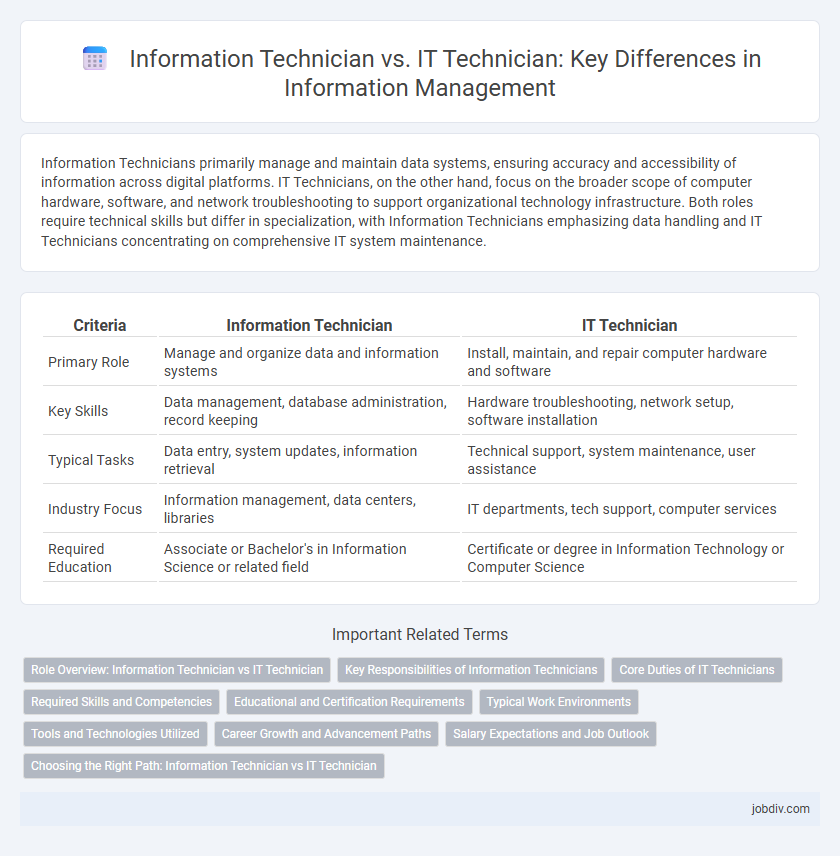Information Technicians primarily manage and maintain data systems, ensuring accuracy and accessibility of information across digital platforms. IT Technicians, on the other hand, focus on the broader scope of computer hardware, software, and network troubleshooting to support organizational technology infrastructure. Both roles require technical skills but differ in specialization, with Information Technicians emphasizing data handling and IT Technicians concentrating on comprehensive IT system maintenance.
Table of Comparison
| Criteria | Information Technician | IT Technician |
|---|---|---|
| Primary Role | Manage and organize data and information systems | Install, maintain, and repair computer hardware and software |
| Key Skills | Data management, database administration, record keeping | Hardware troubleshooting, network setup, software installation |
| Typical Tasks | Data entry, system updates, information retrieval | Technical support, system maintenance, user assistance |
| Industry Focus | Information management, data centers, libraries | IT departments, tech support, computer services |
| Required Education | Associate or Bachelor's in Information Science or related field | Certificate or degree in Information Technology or Computer Science |
Role Overview: Information Technician vs IT Technician
An Information Technician primarily manages data systems, ensuring accurate information storage, retrieval, and security within an organization. An IT Technician focuses on maintaining and troubleshooting hardware, software, and network infrastructure to support overall technology operations. Both roles require technical expertise, but Information Technicians emphasize data-centric tasks while IT Technicians handle broader technological support.
Key Responsibilities of Information Technicians
Information Technicians primarily handle the collection, processing, and management of data to ensure accurate and reliable information flow within organizations. Their key responsibilities include maintaining databases, performing data entry and verification, and supporting information system users to enhance operational efficiency. They also monitor data integrity and assist in troubleshooting basic technical issues related to information systems.
Core Duties of IT Technicians
IT Technicians primarily focus on maintaining computer systems, troubleshooting hardware and software issues, and ensuring network security across organizational infrastructures. Their core duties include installing and configuring computer systems, diagnosing technical problems, and providing technical support to end-users to optimize operational efficiency. In contrast, Information Technicians may have a broader role that can encompass managing data systems and assisting with information management but typically involve less hands-on hardware support.
Required Skills and Competencies
Information Technicians require strong data management, troubleshooting, and communication skills to support information systems and archival processes efficiently. IT Technicians demand expertise in network administration, hardware maintenance, software installation, and cybersecurity protocols to ensure optimal IT infrastructure performance. Both roles emphasize problem-solving abilities and technical proficiency, but IT Technicians typically need deeper knowledge of system configurations and network security measures.
Educational and Certification Requirements
Information Technicians typically require a broad educational background in information science or management, often holding an associate or bachelor's degree in information technology, information systems, or library science. IT Technicians usually need specialized certifications such as CompTIA A+, Network+, or Microsoft Certified Solutions Associate (MCSA) alongside a degree in computer science or information technology to demonstrate proficiency in hardware, software, and networking skills. Certifications and formal education for both roles emphasize practical technical knowledge but differ in focus, with Information Technicians leaning towards data management and IT Technicians concentrating on network infrastructure and system support.
Typical Work Environments
Information Technicians commonly work in corporate offices, data centers, and government agencies where managing and securing data is critical. IT Technicians are frequently found in varied settings including schools, hospitals, and retail environments, providing direct support for hardware, software, and network issues. Both roles often require on-site presence but can also extend to remote troubleshooting and system maintenance.
Tools and Technologies Utilized
Information Technicians primarily utilize hardware diagnostic tools, network analyzers, and database management systems to maintain and troubleshoot information systems. IT Technicians employ a broader range of technologies including software installation packages, cybersecurity solutions, virtualization platforms, and cloud services to support and secure IT infrastructure. Both roles rely heavily on programming languages and system monitoring tools, but IT Technicians often engage more with advanced networking protocols and enterprise-level software applications.
Career Growth and Advancement Paths
Information Technicians typically focus on managing data systems and ensuring information accuracy, while IT Technicians specialize in maintaining and troubleshooting hardware and networks. Career growth for Information Technicians often leads to roles like Data Analyst or Information Systems Manager, emphasizing data management skills. IT Technicians can advance to positions such as Network Administrator or IT Manager, highlighting expertise in technical infrastructure and support.
Salary Expectations and Job Outlook
Information Technicians typically earn a median salary of around $50,000 annually, with job growth projected at 5% over the next decade, reflecting steady demand in data management roles. IT Technicians often command higher salaries, averaging $60,000 per year, driven by increasing needs for network support and cybersecurity, with job opportunities expected to grow by 8%. Salary expectations vary based on specialization, experience, and industry, while the IT Technician field generally offers stronger job prospects due to rapid technological advancements and digital infrastructure expansion.
Choosing the Right Path: Information Technician vs IT Technician
Choosing the right path between an Information Technician and an IT Technician depends on career goals and skill sets, as Information Technicians primarily manage data systems and ensure accurate information flow, while IT Technicians focus on hardware, software maintenance, and network support. Both roles require strong technical expertise, but Information Technicians often engage in database management and data analysis, whereas IT Technicians handle troubleshooting, system installations, and user support. Understanding these distinctions is essential for aligning job responsibilities with personal interests and industry demands.
Information Technician vs IT Technician Infographic

 jobdiv.com
jobdiv.com